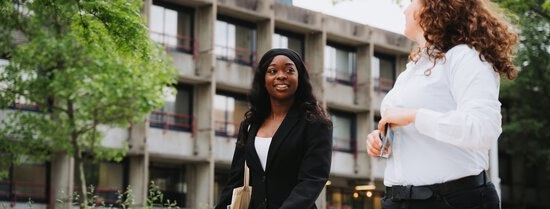Saving a seat for someone at the lunch table, saying good morning or paying someone a compliment. These may seem like small things, but they are actually very important. During her PhD trajectory at Rotterdam School of Management, Rowan Moelijker is researching how you can help your colleagues feel at home at work.
Organisations are increasingly striving for inclusion. They usually look to policies or leadership to drive inclusion. The role of interactions with colleagues is often overlooked. 'Little research has been done on this, even though colleagues play an important role. Almost anyone can remember a moment when colleagues did something that made us feel part of the group', says Rowan.
Feeling at home and being appreciated
The PhD trajectory consists of several studies, including an interview study conducted at an organisation with branches in Western Europe and Southeast Asia. The interview study and a follow-up online study with American employees show that the following two conditions are important for employees to experience inclusion in the workplace:
- Feeling part of the group
- Being valued for unique talents

Firstly, it is important that people feel connected at work. That they feel part of the group. 'A colleague who saves you a seat at the lunch table. Or pulls up a chair when you walk in. Asking how someone is doing at the start of a meeting. These are small things that most people already do. You often don't think about it consciously. But research shows that this means a lot to colleagues', says the scientist.
The second aspect is more task-oriented. Getting the chance to be yourself plays a major role in this; getting the opportunity to show your unique characteristics. 'People feel good when they are asked for advice because of their expertise.'
Moelijker sees a lot of low-hanging fruit when it comes to creating inclusion in the workplace. 'It doesn't have to take much effort. Just a smile or eye contact with a colleague can go a long way. In some interviews, people said that they already feel seen when someone gives them a thumbs up during a Teams meeting. Such small interactions can make a difference in someone's mood for the day.'

'It doesn't have to take much effort. Just a smile or eye contact with a colleague can go a long way'
Rowan Moelijker
PhD candidate at RSM, Erasmus University
Inclusion makes people engaged and more productive
The PhD trajectory shows that interactions with colleagues are very important. On days when employees experience inclusion, they immediately see the benefits: 'We conducted two studies in which we followed employees for ten days. We observed that people who feel part of the group and are valued for their talents have more energy and are more likely to achieve their goals for the day. They also feel more engaged at the end of the day. Inclusion from colleagues is therefore not only important for feeling good at work, it also helps you achieve your goals.'

The research focuses on the behaviour of colleagues. That does not mean that the organisation itself does not have to do anything. 'An organisation can establish norms. Ensure that people have the space to connect in the workplace. For example, it can help to make time for social connections, but also to encourage knowledge exchange between colleagues. As a manager, you can also ask about this in research and development talks. How do you feel about how colleagues interact with each other in the team? This shows that you, as an employer, consider it important.'
What can you do yourself right away?
We now know that people want to be part of the group and that they want to be valued for their knowledge and skills. And the more colleagues feel at home within the organisation, the more productive they are. But what is the first thing you can apply yourself tomorrow?
'Start with something small. A smile or asking someone how they are doing. By showing interest, you involve your colleagues. And as the PhD research shows, that is good for everyone', Moelijker concludes.

- More information
More science stories? Check out our online magazine Erasmus Extra.
Press
For more information, please contact Danielle Baan at Rotterdam School of Management, Erasmus University, by phone at +31 (0)6 45 60 22 22 or by mail.- Related content

